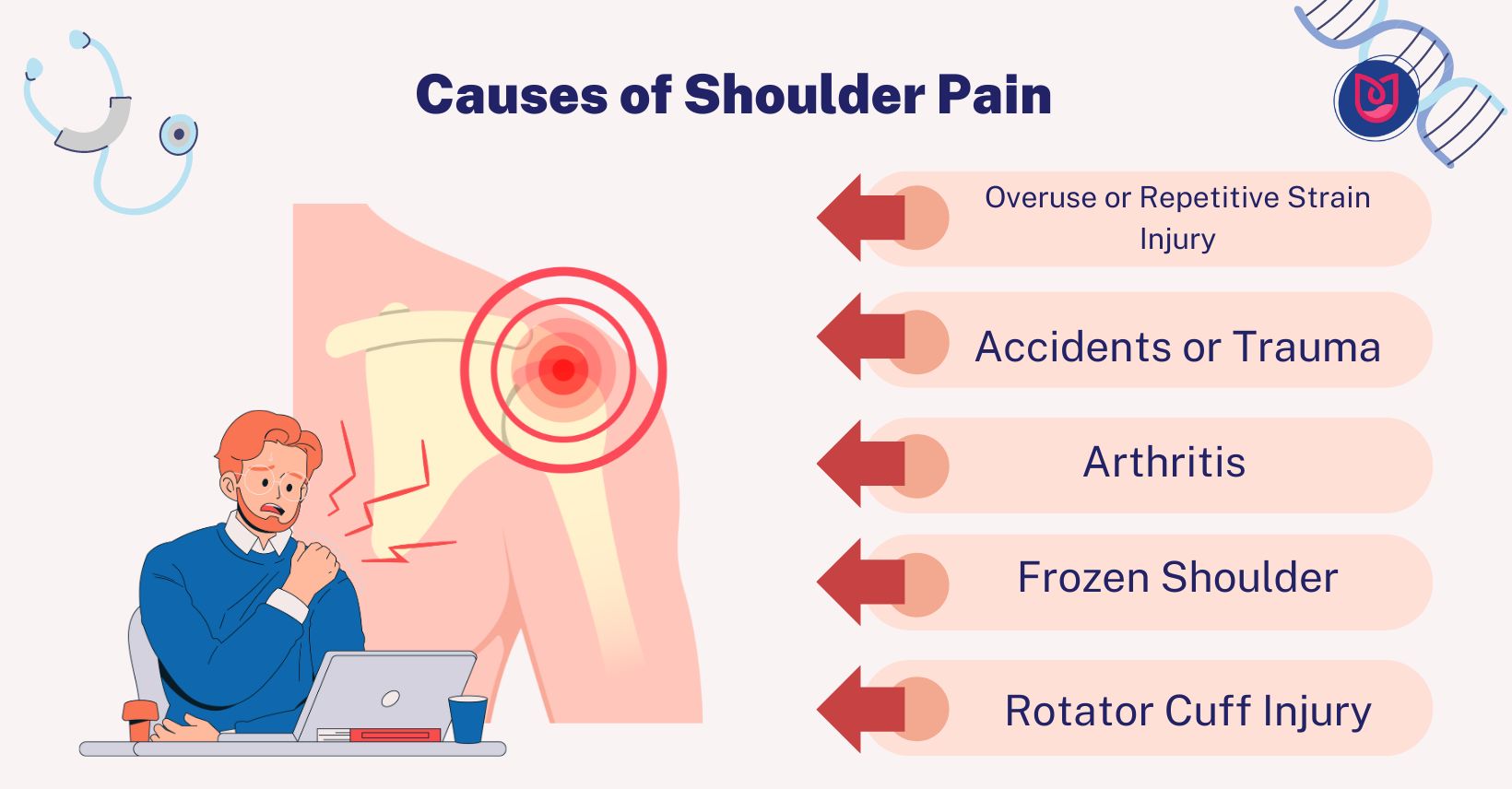
Are you suffering from shoulder pain and seeking professional care for relief? We provide comprehensive information on shoulder pain, including its causes, symptoms, diagnosis, and treatment options.
Understanding the necessity of consulting a specialist for shoulder pain treatment will help you achieve a quicker and more effective resolution.
We’ll guide you through prevention and management strategies to enhance your quality of life.
What is Shoulder Pain?
Shoulder pain is discomfort in or around the shoulder joint arising from the joint, muscles, ligaments, or tendons. The severity of this pain can range from mild, temporary aches to persistent, severe discomfort that restricts mobility. Understanding these variations is key to effectively addressing the underlying causes.
What Causes Shoulder Pain?

Shoulder pain can be caused by various factors, including repetitive strain, accidents, and medical conditions such as arthritis and rotator cuff injuries. Each cause uniquely impacts the shoulder, necessitating specific treatment approaches. Accurate identification of these causes is therefore crucial for effective management and prevention.
Overuse or Repetitive Strain Injury
Repetitive motions, common in sports or certain occupations, often lead to shoulder overuse injuries. These gradually stress the joint and can escalate into chronic pain if early signs are overlooked. This concept of progression due to ignored symptoms segues into how accidents impact shoulder health.
Accidents or Trauma
Traumatic incidents, such as falls or impacts, can cause severe shoulder injuries like dislocations or fractures, leading to acute and intense pain. These injuries necessitate immediate attention to prevent long-term damage, much like the chronic conditions arthritis can cause.
Arthritis
Arthritis in the shoulder manifests as joint inflammation and stiffness, significantly reducing mobility. Osteoarthritis and rheumatoid arthritis affect the joint with varying symptoms but share the commonality of progressive joint deterioration, similar to the stages experienced in a frozen shoulder.
Frozen Shoulder
Frozen shoulder progresses through stages from painful stiffening to severe immobility before gradually improving. The condition reflects how joint issues can evolve, leading to different interventions, including managing rotator cuff injuries.
Rotator Cuff Injury
Rotator cuff injuries, caused by repetitive use or trauma, impact shoulder stability and movement. Symptoms include pain and limited motion, often treated with physiotherapy or surgery, depending on severity. Understanding these symptoms is vital to diagnosing the specific type of shoulder pain.
What Are the Symptoms of Shoulder Pain?
Symptoms of shoulder pain can range from mild discomfort to severe pain, often accompanied by stiffness and a restricted range of movement.
Common symptoms associated with shoulder pain include:
- Sharp or dull pain: Pain in the shoulder can vary from sharp, stabbing sensations to dull, aching discomfort.
- Stiffness: Feeling tightness or limited mobility in the shoulder joint, making it challenging to perform daily tasks.
- Pain worsens with movement: Experiencing increased pain when moving the shoulder in certain directions or performing specific activities.
- Numbness or tingling: Sensations of numbness or tingling in the shoulder or down the arm may accompany shoulder pain.
How Is Shoulder Pain Diagnosed?
The diagnosis of shoulder pain begins with a comprehensive physical examination and a review of the patient’s medical history, followed by imaging tests to identify the specific cause of the pain. This process ensures that the treatment plan effectively focuses on the underlying issues.
What Are the Types of Treatments Available for Shoulder Pain?
Treatment for shoulder pain varies from physiotherapy and medication to more invasive procedures like injections and surgery to the severity and underlying cause of the pain.
Physiotherapy
Physiotherapy addresses shoulder pain through targeted exercises and manual therapies to restore function and alleviate discomfort. Strengthening surrounding muscles and improving flexibility are pivotal, as is educating patients on posture and lifestyle adjustments to prevent future issues.
Medications
Medications reduce pain and inflammation and are selected based on the patient’s specific needs, from over-the-counter pain relievers to prescription muscle relaxants. However, each medication comes with potential side effects, requiring careful consideration, much like the decision to use injections.
Injections
Injections like corticosteroids directly target inflammation in the shoulder, offering rapid relief. Although effective, their benefits can be temporary, necessitating periodic treatments and careful management, similar to the considerations required when contemplating surgery.
Surgery
Surgery may be necessary for severe cases where other treatments have failed. It involves procedures to repair or replace damaged tissues—post-operative recovery and rehabilitation to the patient’s specific needs, focusing on restoring functionality and preventing recurrence.
How Can Shoulder Pain Be Prevented?
Preventing shoulder pain requires ergonomic adjustments and correct lifting techniques to maintain joint health. Regular stretching and strength exercises minimise the risk of injuries and underscore the value of consistent physical care. This holistic approach often necessitates the guidance of healthcare professionals.
Why Should You Seek a Physiotherapist to Treat Shoulder Pain?
Consulting a physiotherapist for shoulder pain offers a tailored treatment strategy that enhances recovery and promotes sustained shoulder health. Professionals like Andre Tulip provide focused interventions that alleviate symptoms and tackle the root causes, setting the stage for successful management and a better quality of life. This individualised care forms the core of Andre Tulip’s treatment protocol.
What Can You Expect During Shoulder Pain Treatment with Andre Tulip?
Under the supervision of Andre Tulip, patients experience thorough assessments that lead to customised treatment plans. His methods aim to relieve pain and prevent future issues, ensuring a comprehensive approach to care. Following this detailed preparation, patients are well-informed about what to anticipate in their therapy sessions.
Are You Ready for a Therapy Session with Andre Tulip? Book Your Appointment Today!
Don’t allow shoulder pain to restrict your activities; scheduling a consultation with Andre Tulip could mark the beginning of your path to recovery. Early intervention by a skilled physiotherapist like Tulip can dramatically enhance your mobility and overall well-being, enabling you to resume your normal lifestyle free from pain.
Frequently Asked Questions
How can I tell if shoulder pain is serious?
A thorough assessment by a qualified physiotherapist is necessary to determine if shoulder pain is serious. Signs that the pain may be severe include persistence despite rest and non-prescription pain relief and any limitation in range of motion during daily activities like reaching overhead.
Professional evaluations are essential to pinpoint the cause of the pain, such as injuries, overuse, or conditions like a rotator cuff tear or frozen shoulder. Without accurate diagnosis, the pain may worsen, causing long-term complications.
Will shoulder pain heal on its own?
While minor shoulder pain might resolve independently, persistent or severe pain usually requires professional intervention. Healing is influenced by factors like age, overall health, and the specific cause of the pain. Physiotherapy is important, focusing on strengthening, improving flexibility, and correcting biomechanical imbalances. Physiotherapy plans assist patients in regaining mobility and functionality, enhancing their quality of life.
How to relieve shoulder pain?
Relieving shoulder pain typically involves exercises and ergonomic adjustments. Exercises such as shoulder blade squeezes, wall press-ups, and rotations strengthen the muscles around the joint, enhancing support and stability. Ergonomic adjustments like correct posture, appropriate chair height, and properly positioned monitors help avoid positions that aggravate the pain. Regular movement breaks and a supportive pillow while sleeping also contribute to pain relief by maintaining spinal alignment and reducing shoulder pressure.
When should I see a physiotherapist for shoulder pain?
You should consult a physiotherapist if shoulder pain persists for more than a few days, is severe, or occurs with other concerning symptoms. Delaying medical consultation can lead to the worsening of conditions and long-term damage. Prompt medical attention aids in diagnosing the pain’s root cause and preventing the progression of underlying issues, improving outcomes for conditions such as rotator cuff injuries and arthritis.
What actions should be avoided when experiencing shoulder pain?
When experiencing shoulder pain, avoid actions that worsen the pain or cause further injury. Avoid strenuous activities that trigger discomfort. Maintain proper posture and incorporate gentle stretches and strengthening exercises, but do not overexert yourself. Avoid heavy lifting or repetitive overhead activities. Techniques like yoga or meditation may also help reduce stress and alleviate shoulder pain.